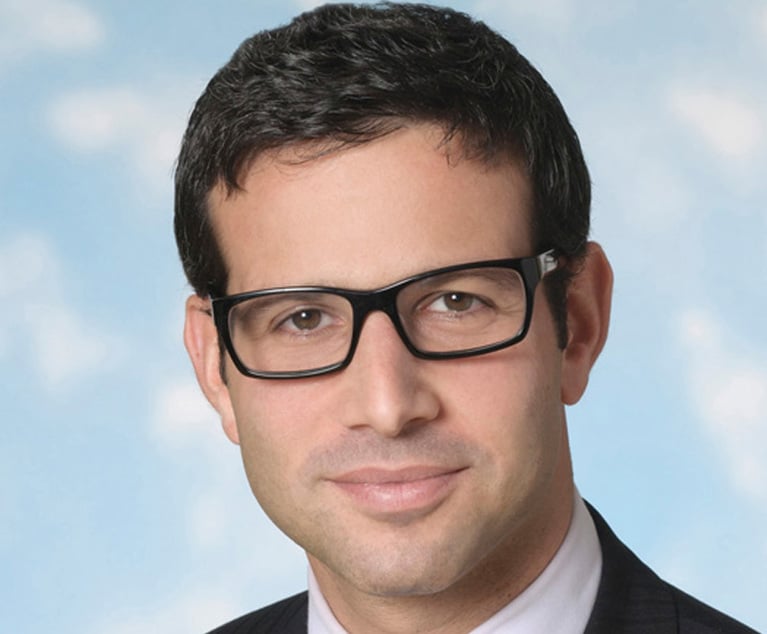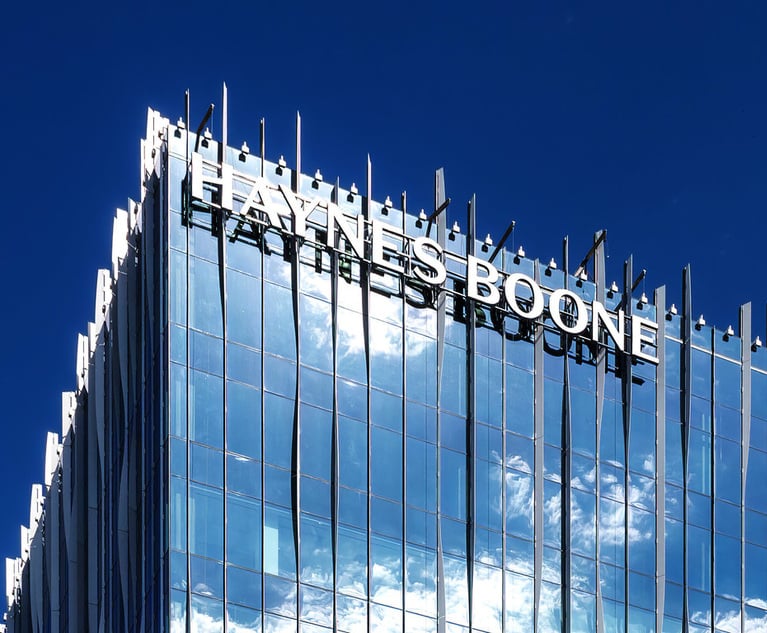Litigation Department of the Year 2018: McKool Smith
With 186 lawyers in offices in Austin, Dallas, Houston, Marshall, Los Angeles, New York, Silicon Valley and Washington, D.C., McKool Smith focuses on trying cases.
August 31, 2018 at 06:00 AM
5 minute read
 (l-r) Theodore Stevenson, David Sochia, and Douglas Cawley, principals at McKool Smith in Dallas.
(l-r) Theodore Stevenson, David Sochia, and Douglas Cawley, principals at McKool Smith in Dallas.
Winner in the Midsize Firm Category
After veteran music producer Quincy Jones sued the estate of the late “King of Pop” Michael Jackson, he sought the help of McKool Smith and its founder and chairman, Mike McKool, to try the case in 2017 in the Superior Court of California in Los Angeles. The result was a $9.4 million verdict for Jones.
“It was probably my favorite case I've tried,” said McKool, Jones' lead counsel.
Jones had produced several of Jackson's biggest albums, including “Off the Wall,” “Thriller” and “Bad.” As alleged in the complaint in Jones v. MJJ Productions, Jones had entered into agreements with Jackson in 1978 and 1985 that gave Jones the first opportunity to re-edit or re-mix masters for the albums and required that he be paid royalties.
The lawsuit centered on allegations that MJJ Productions, which is controlled by Jackson's estate, failed to pay Jones royalties for the soundtrack to “This Is It,” a documentary released after Jackson's death in 2009, and for Jackson's Cirque du Soleil productions, which featured musical hits produced by Jones.
Jones alleged in the complaint that through “clandestine” agreements with Sony Music, which released the soundtrack to the film, MJJ disguised “royalties” as “profit” and diverted the disguised royalties to itself.
“Our allegation was that was a sham,” McKool said.
The jury returned its verdict on July 26, 2017, finding that MJJ owed Jones unpaid royalty fees. The significance of the verdict, McKool said, is “you can't mask a royalty with another name and have it paid out in a different way.”
The Jackson estate has filed an appeal, which remains pending.
With 186 lawyers in offices in Austin, Dallas, Houston, Marshall, Los Angeles, New York, Silicon Valley and Washington, D.C., McKool Smith focuses on trying cases.
“From day one, we've been a litigation-only firm; we do no transactional work,” McKool said.
In 2017, the firm won a victory at the International Trade Commission on behalf of TiVo and its subsidiaries Rovi Corp. and Rovi Guides Inc. in patent infringement litigation against Comcast. Rovi alleged infringement of two TiVo patents covering set-top boxes technology that provides television features to Comcast customers, such as remote recording.
“Preparing for a procedure in the ITC is very demanding,” said McKool Smith Dallas principal Doug Cawley, lead counsel for Rovi. “From filing of the complaint to trial takes about nine months.”
Cawley said extensive briefing was required in the Rovi case; some briefs filed on both sides of the case were more than 1,000 pages long.
On May 26, 2017, an ITC administrative law judge issued an initial determination in Rovi's favor, finding that Comcast had violated Section 337 of the Tariff Act of 1930, which involves imports. In its final ruling on Nov. 22, 2017, the commission affirmed much of the ALJ's initial determination. It also issued an exclusion order and a cease and desist order prohibiting Comcast from importing into the U.S. any set-top box infringing any of the asserted claims of the patents at issue.
Also in 2017, McKool Smith obtained a verdict on behalf of Ericsson Inc. and Telefonaktiebolaget LM in its cellphone patent infringement case against TCL Communication Technology Holdings Ltd. On Dec. 7, 2017, after a four-day trial in the U.S. District Court for the Eastern District of Texas, the jury found that TCL willfully infringed claims of an Ericsson patent by selling phones and devices equipped with the Google Android operating system and awarded $75 million as reasonable royalty damages.
In preparing for trial in Ericsson v. TCL Communications Technology Holdings Ltd., McKool Smith's team surveyed more than 1,000 Android customers to determine what the feature in question is worth and found that 28 percent of them wouldn't buy the phone without that feature, according to McKool Smith principal Ted Stevenson of Dallas, Ericsson's lead counsel. The popularity of this feature to TCL customers, which allows an Android user to place restrictions on the ability of third-party applications to access the user's phone data and hardware, meant that TCL had substantial at-risk profits without a license, Stevenson noted.
Stevenson said, “We try a lot of patent cases, and I think we're getting pretty good at explaining technology and persuading juries. Our lawyers are getting it down to a science.”
In March 2018, U.S. Magistrate Judge Roy S. Payne ordered the damages portion of the verdict set aside for a new trial but held that the jury's finding of infringement was supported. Reconsidering his decision in May, Payne denied TCL's motions for judgment as a matter of law and a new trial. He also enhanced the damages by $25 million and awarded interest for a judgment of almost $110 million.
“I think the court eventually got comfortable with our survey as it reconsidered our trial proof in view of the verdict,” Stevenson said.
This content has been archived. It is available through our partners, LexisNexis® and Bloomberg Law.
To view this content, please continue to their sites.
Not a Lexis Subscriber?
Subscribe Now
Not a Bloomberg Law Subscriber?
Subscribe Now
NOT FOR REPRINT
© 2025 ALM Global, LLC, All Rights Reserved. Request academic re-use from www.copyright.com. All other uses, submit a request to [email protected]. For more information visit Asset & Logo Licensing.
You Might Like
View All
Kirkland's Daniel Lavon-Krein: Staying Ahead of Private Equity Consolidation

Vinson & Elkins: Traditional Energy Practice Meets Energy Transition
4 minute read
Advising 'Capital-Intensive Spaces' Fuels Corporate Practice Growth For Haynes and Boone
4 minute read
Get to Know Texas Lawyer's Attorney of the Year Finalists
Trending Stories
Who Got The Work
Michael G. Bongiorno, Andrew Scott Dulberg and Elizabeth E. Driscoll from Wilmer Cutler Pickering Hale and Dorr have stepped in to represent Symbotic Inc., an A.I.-enabled technology platform that focuses on increasing supply chain efficiency, and other defendants in a pending shareholder derivative lawsuit. The case, filed Oct. 2 in Massachusetts District Court by the Brown Law Firm on behalf of Stephen Austen, accuses certain officers and directors of misleading investors in regard to Symbotic's potential for margin growth by failing to disclose that the company was not equipped to timely deploy its systems or manage expenses through project delays. The case, assigned to U.S. District Judge Nathaniel M. Gorton, is 1:24-cv-12522, Austen v. Cohen et al.
Who Got The Work
Edmund Polubinski and Marie Killmond of Davis Polk & Wardwell have entered appearances for data platform software development company MongoDB and other defendants in a pending shareholder derivative lawsuit. The action, filed Oct. 7 in New York Southern District Court by the Brown Law Firm, accuses the company's directors and/or officers of falsely expressing confidence in the company’s restructuring of its sales incentive plan and downplaying the severity of decreases in its upfront commitments. The case is 1:24-cv-07594, Roy v. Ittycheria et al.
Who Got The Work
Amy O. Bruchs and Kurt F. Ellison of Michael Best & Friedrich have entered appearances for Epic Systems Corp. in a pending employment discrimination lawsuit. The suit was filed Sept. 7 in Wisconsin Western District Court by Levine Eisberner LLC and Siri & Glimstad on behalf of a project manager who claims that he was wrongfully terminated after applying for a religious exemption to the defendant's COVID-19 vaccine mandate. The case, assigned to U.S. Magistrate Judge Anita Marie Boor, is 3:24-cv-00630, Secker, Nathan v. Epic Systems Corporation.
Who Got The Work
David X. Sullivan, Thomas J. Finn and Gregory A. Hall from McCarter & English have entered appearances for Sunrun Installation Services in a pending civil rights lawsuit. The complaint was filed Sept. 4 in Connecticut District Court by attorney Robert M. Berke on behalf of former employee George Edward Steins, who was arrested and charged with employing an unregistered home improvement salesperson. The complaint alleges that had Sunrun informed the Connecticut Department of Consumer Protection that the plaintiff's employment had ended in 2017 and that he no longer held Sunrun's home improvement contractor license, he would not have been hit with charges, which were dismissed in May 2024. The case, assigned to U.S. District Judge Jeffrey A. Meyer, is 3:24-cv-01423, Steins v. Sunrun, Inc. et al.
Who Got The Work
Greenberg Traurig shareholder Joshua L. Raskin has entered an appearance for boohoo.com UK Ltd. in a pending patent infringement lawsuit. The suit, filed Sept. 3 in Texas Eastern District Court by Rozier Hardt McDonough on behalf of Alto Dynamics, asserts five patents related to an online shopping platform. The case, assigned to U.S. District Judge Rodney Gilstrap, is 2:24-cv-00719, Alto Dynamics, LLC v. boohoo.com UK Limited.
Featured Firms
Law Offices of Gary Martin Hays & Associates, P.C.
(470) 294-1674
Law Offices of Mark E. Salomone
(857) 444-6468
Smith & Hassler
(713) 739-1250






